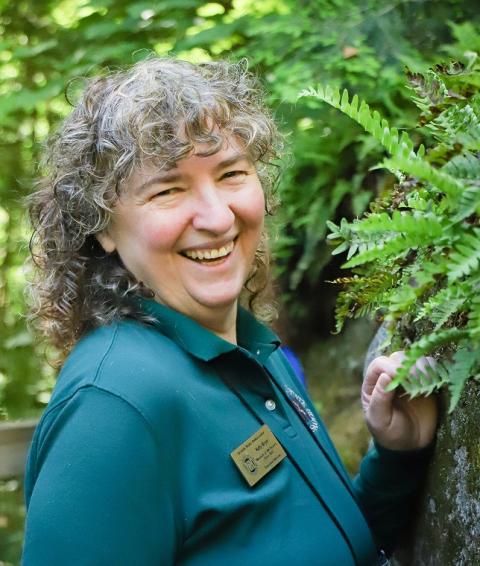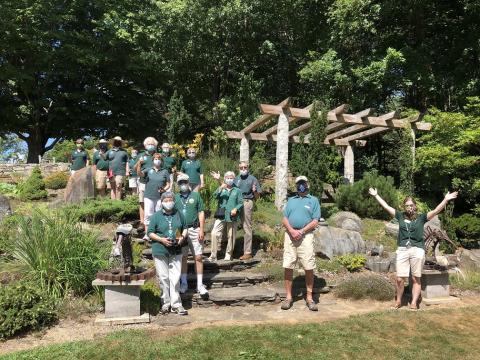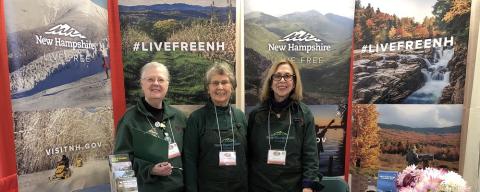Stepping Up the Granite #3:
Stepping Up the Granite examines the intersection of tourism, community development, and quality of life through interviews with New Hampshire people committed to championing the Granite State. Kelly Bryer, Executive Director of Granite State Ambassadors (nhgranitestateambassadors.org), joins us for the third installment of this series.

Kelly Bryer (Photo: Colleen Eliason/GSA)
Kelly Bryer, a resident of Thornton, has long had interests in marketing, community economic development, and program planning. Prior work with a regional marketing organization initially led her to Granite State Ambassadors (GSA), a travel and tourism focused 501(c)(3) non-profit organization that provides support to a variety of businesses, organizations, and agencies in New Hampshire. In 2015, Kelly became Executive Director, which she describes as “the best job in the world.” Granite State Ambassadors and UNH Cooperative Extension are no strangers to one another, having collaborated in planning the NH Farm, Forest, and Garden Expo and offering guest speaking for one another’s programs, such as an agritourism planning workshop and a volunteer education webinar. In March of 2023, Kelly joined Jada Lindblom, UNH Extension Community and Economic Development Specialist, for a conversation about GSA and their shared interests in tourism development.
Jada: Hi Kelly. To start, how do you describe the Granite State Ambassadors program?
Kelly: That’s an easy and a hard question. The Granite State Ambassadors is a 501(c)3 educational nonprofit. We have two key partners, the Manchester-Boston Regional Airport and the New Hampshire Division of Travel and Tourism Development. Overall, we're pretty multipronged, with several distinct audiences and benefactors. The tourism industry is our number one – we’re their word-of-mouth marketing team. Industry members partner with us to provide educational tours and opportunities about their businesses and organizations, hoping that our volunteers are impressed and refer guests. The best parts of these tours are the behind-the-scenes tidbits of information – that’s what the volunteers love most. Volunteers also add value to welcome centers, museums, gardens, the State House, and events by providing high-quality staffing support. We also provide guest experience career development trainings for tourism industry members. And finally, through partnerships and collaborations, we bring together organizations. For example, at our recent training during our outdoor recreation module, New Hampshire State Parks and the New Hampshire Rail Trail Coalition were listening to each other's presentations and found something that they shared, and so now they're going to be furthering their conversation so that they can collaborate, which I thought was pretty cool. And that happens a lot, actually.
J: That's really cool, bringing different people to the table and seeing what might happen from there…
K: Exactly. And another audience is, of course, our volunteers. We have a pretty enriching program. We create a certain atmosphere, and that's to satisfy our volunteers’ desire to contribute to the state's economy. They love to learn about our state through our tours, articles, and lectures. And most of all, they love to share that knowledge and give our guests the best experience possible. They also make some pretty deep friendships with our social environment. And then the last prong is our guests. Our volunteers have a real pride about our state and its offerings, and this really shines through when they're warmly welcoming our guests. For every dollar that the Division of Travel and Tourism spends on marketing, $16 is returned to our state in the form of meals and rooms tax. When you add peripheral spending, this number increases exponentially. So, it’s the Division’s job to bring the guests here, and then it's our job to ensure that they have a great experience and come back.
J: Since taking on the Executive Director role, what have been some of your goals and priorities for GSA?
K: My first goal was to get the organization on solid ground financially and make sure that we were alive for the long haul. It had always been a labor of love from our founders. We successfully reworked our budget and our fundraising programs to create sufficient operating capital and emergency savings. During the pandemic, like almost everybody else, we had to quickly develop a survival plan. It had to be multi-pronged, and it had to not only engage our volunteers, but it had to provide some needed support to the tourism industry, as well. That just happened to be our 25th Anniversary year, so we came up with monthly themes including regions of the state, natural and cultural resources, and agriculture. Then, each of those months we would do an in-depth virtual study on that topic. We had virtual tours, articles, photos, and social opportunities. We got pretty creative, and our goal was to keep our volunteers engaged while learning as much as possible. That way, when they did go back to their duties, they would be stronger and more knowledgeable, and they could give even better referrals. Through these efforts, we fostered a lot of new partnerships, like this one with UNH Cooperative Extension. We diversified our revenue by becoming managers for the Farm, Forest and Garden Expo and some other programs. Now, we're focusing on getting the word out about our organization and recouping our volunteer pool. We generally had maintained a force of about 350 actively volunteering GSAs, and we dropped down to around 100 during the pandemic. We anticipate being close to 300 by the end of this year, and we'll be back to full force by next spring. Then, from there, it's really just about building more partnerships.
J: Yeah. That's great. What sort of partnerships are on your mind right now?
K: Well, I’m loving this partnership with Cooperative Extension. And we've had a lot of interest from events. You know, everybody's short staffed, and a lot of organizations have had that same reduction of their volunteers [following COVID-19]. So, for now, we're really just trying to rebuild ourselves by cultivating partnerships and being supportive to the industry.
J: I'm interested in tourism and community relations, because in tourism destination communities, there can often be this “us-versus-them” mentality between locals and visitors, and visitors might experience a place very differently than locals do. One thing I appreciate about the GSA program is it creates ways for local people to get involved with tourism and interact with visitors, even if they're not in tourism-related lines of work themselves. Do you think that having the structure of “ambassadors” volunteering throughout the state helps to break down some of these divides between locals and visitors?
K: Oh, absolutely. Our volunteers really care about our guests’ experiences and their role in supporting the tourism industry. They really make a point to experience New Hampshire just as a guest would. Like, we don't have buses for our tours; they all drive. That's so that they look at the map, see the directions, see where there might be some problems. They experience the parking for themselves, and then they go out for coffee afterwards. It's the whole package. They experience the town so they can make suggestions after their visits. They're never required to give a referral, but they feel compelled to when they're impressed and when they enjoy their own experiences. If you've talked to one of our volunteers, you can see that this approach really shows with each interaction.
J: I like that level of intentionality of really creating a visitor-like experience for them. I often talk about how locals can “play tourist” and how they might have a really good time doing so. As locals, we sometimes forget to take the time to experience nearby places like museums and attractions, or even to support local businesses like restaurants and cafes. It might be something we keep putting off but could really be enjoying.
K: And a lot of folks don't realize how much things have changed. Even within our GSAs, we'll have a tour to an attraction, and one of our volunteers might say, “oh, well, I went there years ago.” Well, it's very different now! Once they experience it again, it reintroduces them and then they're all energized about it.
J: Clearly, GSAs play important roles in the travel and tourism promotion space. But they're also engaged with other events and organizations, as you've mentioned, that are for broader audiences, such as the NH Farm, Forest and Garden Expo. A common thread, to me, seems to be that GSA’s engagements are all centered around showcasing and celebrating New Hampshire's varied offerings and its ways of life. Do you agree with that? And then how do you decide which activities or programs to support or be a part of?
K: Yeah, absolutely. And it's tough because there are a lot of things that we could do, and of course we have to keep in mind our ability to fulfill obligations for numbers of volunteers and dates and not overbook things. But for the most part, it all has to meet our criteria. Each activity and program has to contribute to sustaining our organization, either financially or through partnerships that support our operations. It has to support the tourism industry, and it also has to give back to our volunteers with either an opportunity to serve or to learn.
J: Do you feel like you're quite in demand?
K: Yes, especially since the pandemic. We get calls weekly from different events looking for support. But until we get our volunteer numbers back, we have to take care of what we have first and then we can look at growing.
J: Right. What do you think GSA volunteers find most fulfilling about their roles?

Volunteers visiting Bedrock Gardens in Lee, NH (Photo: GSA)
K: Well, we have a survey we do every year and we asked them that question. There are some common threads. As some examples: “it feels good to give back to my community;” “it provides a sense of pride when I'm able to assist somebody;” and “I meet wonderful people who are interested and love New Hampshire like I do.”
J: That's really great. If somebody reading this wants to get involved, what should they do? Are there certain skills or types of people who you are looking to recruit or engage as volunteers?
K: Our website, of course, is a big source of information (nhgranitestateambassadors.org). Our volunteers are all required to attend a two-day certification training. This introduces them to all of the resources for answering guests’ questions. We have over 20 presenters from agencies and businesses, as well as an introduction to our organization and guest experience training. Demographically, we tend to attract many retired professionals – a lot of teachers, nurses, people who are in caregiver-type positions, a lot of management, doctors, lawyers, things like that. As far as the type of person is concerned: positive, enthusiastic. That's what we're looking for. If you're smiling and you're generally a happy person who likes to share your knowledge and your favorite places, you’d be a good fit for GSA!
-JL
Note: This interview has been edited for length and clarity.
For more information about Granite State Ambassadors, visit https://nhgranitestateambassadors.org.
Also read:
Stepping Up the Granite #1: A Conversation with Mark Hayes of Highland Mountain Bike Park and the Foothills Foundation (https://extension.unh.edu/blog/2021/09/stepping-granite-1)
Stepping Up the Granite #2: An Interview with Karen Bassett of the New England Coffee Festival (https://extension.unh.edu/blog/2022/04/stepping-granite-2)

